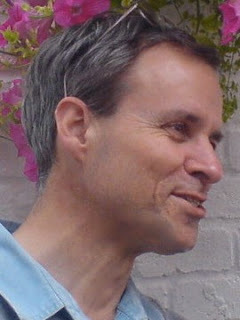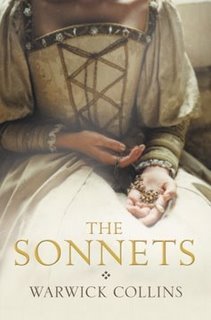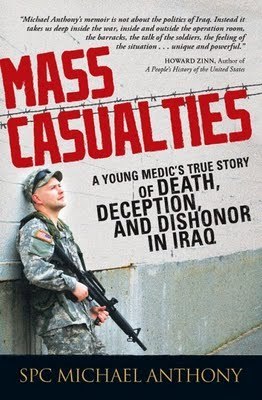Matt Rees's Blog - Posts Tagged "collins"
The Writing Life: Warwick Collins

The riskiest thing for a writer to do is to try to enter the head of a great genius by making that genius the narrator of a novel. Why? Because if you aren’t a genius of at least similar proportions, it won’t ring true. Think of the tedious melodrama that passed for the life of Michelangelo in “The Agony and the Ecstasy”. When that genius is the greatest writer of all time, the risk to our present writer increases proportionally. Warwick Collins, a British novelist and poet, took that chance when he made William Shakespeare the narrator of his novel The Sonnets. But it was worth it, because Warwick succeeded and The Sonnets is by far the most beautiful novel of recent years. It’s also an astonishing examination of why a writer writes and of how a literary work can change along with the life and loves of the writer. That makes Warwick the perfect author to answer the questions posed here in The Writing Life. He has some surprising ideas.
How long did it take you to get published?
I was fortunate that my first book, a sailing thriller called Challenge, was bid for by eight publishers. It was eventually published by Pan/Macmillan
Would you recommend any books on writing?
I don’t know any books on writing that I would recommend. The best way to learn about writing, I suspect, is to read as much good literature as one can.
What’s a typical writing day?
I’m one of those annoying people who feel fresh when they wake up, so I try to put in a minimum of one and a half hours before breakfast. If I feel up to it, I’ll return at various stages in the day. But I find writing is quite a nervous and energy-sapping process, and often I find that after my morning efforts I need the rest of the day to recover and be ready for the next early morning attempt on the blank screen.

Plug your latest book. What’s it about? Why’s it so great?
My most recent novel The Sonnets is an attempt to describe Shakespeare’s life from 1592-4, the years in which the London theatres were closed by threat of plague, and the 29-year-old Shakespeare was forced back on his own resources. He was fortunate to find a patron in the young Earl of Southampton. Those were the years in which many of the other playwrights died of violence (like Marlowe, killed in suspicious circumstances in a pub or Kyd, put on the rack) or of poverty, like Greene. Shakespeare emerged from those turbulent times to become the leading playwright on the Elizabethan stage. During those plague years, too, it is widely believed that Shakespeare wrote the bulk of his great sonnet sequence. I’ve integrated 32 full length sonnets into the text of my novel. I also added two “imitation” sonnets – both carefully flagged up as imitations, by the way. It was fascinating attempting to compose those imitation sonnets, and I think it helped me to gain an insight into the way sonnets are constructed, and how the very tightly defined form imposes on the content.
How much of what you do is formula dictated by the genre within which you write, and how much is as close to complete originality as it’s possible to get each time?
So far I’ve always been criticized by UK and American corporate publishers for NOT writing to a formula and for constantly changing both the subject matter and the style with which it is approached.
Who’s the greatest stylist currently writing?
For prose, Cormac McCarthy; for dialogue, Elmore Leonard.
Who’s the greatest plotter currently writing?
Philip Pullman, for His Dark Materials trilogy.
How much research is involved in each of your books?
I thoroughly recommend writing the first draft of the book before one does detailed research. This appears the wrong way round, but I believe it is still vastly more effective. Knowing the subject matter of the novel greatly narrows the research area, and the result is that the research in that area can be highly focused and detailed. The Rationalist and The Marriage of Souls were both set in the eighteenth century, about which I knew very little. I could have spent years reading up about the eighteenth century and only used a fraction of my laboriously acquired knowledge in the novels. But, for example, once I knew that Silas Grange, the protagonist, was a physician of “modern” outlook (for the times), I could research the area of medical practice in far greater depth than otherwise would have been the case, and virtually all of it was useful.
Where’d you get the idea for your main character?
A number of writers I have talked with are inspired by people whom they’ve met. In my own case, I get interested in an idea first, and after that it’s more a matter of trying to build up a character from the circumstances. In the case of The Rationalist, for example, some of the few things I did know about the eighteenth century were that it was a time of loss of religious faith, of the rise of science, and the loosening of sexual mores – in that way a reflection of our own times. It seemed interesting to me if Grange had elements of a modern scientist in his character, was perhaps a touch obsessive, pragmatic, rational, thorough, and if the femme fatale who brought him down, Mrs Celia Quill, was something of a proto-feminist.
What’s your experience with being translated?
So far pretty good. I’ve been fortunate that my foreign language publishers have chosen good translators.
Do you live entirely off your writing? How many books did you write before could make a living at it?
I have lived mostly off my writing for about 20 years, but I’m unusual in that most of my income has come from foreign language translation/publication, and from occasional forays into screenwriting.
How many books did you write before you were published?
My first published work was a series of poems published in the magazine Encounter. I wrote two novels before Challenge was published. They both seem to me now to be somewhat juvenile, and I would have no interest in either of them being published.
What’s the strangest thing that happened to you on a book tour?
During a tour of Germany for the German edition of my novel Gents, my publisher was based in Munich. Gents is a novel about three immigrant West Indians who run a urinal in London, and spend much time trying to suppress the “cottaging” (sexual activity between men) which goes on in the cubicles. Each of the West Indian main characters is religious and something of a family man, too, so this background activity is somewhat shocking to them. Although I am not gay myself, Gents was fortunate to receive favorable reviews from the gay press, and from West Indian reviewers. I don’t know whether my German publisher, a leading feminist, was being mischievous, but while on book tour she booked me in at a famous gay hotel in Munich. That was a very interesting experience.
What’s your weirdest idea for a book you’ll never get to publish?
The weirdest idea I have had for a book was Gents, and I did publish it, and am glad that I did.
The Real Iraq War: Michael Anthony’s Writing Life
 By now it’s no secret that the Iraq War has been a disillusioning experience for many of the U.S. servicemen sent there. The literature on the war has, so far, been mostly written by journalists. There’s plenty of it, and like most journalism it runs pretty mainstream and inoffensive, no matter how bloody the scenes depicted. But Michael Anthony, a veteran of the war, has a different perspective. His new book Mass Casualties: A Young Medic’s True Story of Death, Deception, and Dishonor in Iraq is the best account yet of a war that continues to cost lives and to sully the image of the democracy in whose name it was supposedly fought. It’s a subject I’ve thought about a great deal as I travel my corner of the Middle East and as I continue to encounter fighters – Israeli and Palestinian – who endure personal hardship and tormenting nightmares when they face the realities of war. So read the book. Meantime, here's Michael's Writing Life.
By now it’s no secret that the Iraq War has been a disillusioning experience for many of the U.S. servicemen sent there. The literature on the war has, so far, been mostly written by journalists. There’s plenty of it, and like most journalism it runs pretty mainstream and inoffensive, no matter how bloody the scenes depicted. But Michael Anthony, a veteran of the war, has a different perspective. His new book Mass Casualties: A Young Medic’s True Story of Death, Deception, and Dishonor in Iraq is the best account yet of a war that continues to cost lives and to sully the image of the democracy in whose name it was supposedly fought. It’s a subject I’ve thought about a great deal as I travel my corner of the Middle East and as I continue to encounter fighters – Israeli and Palestinian – who endure personal hardship and tormenting nightmares when they face the realities of war. So read the book. Meantime, here's Michael's Writing Life.How long did it take you to get published?
I started writing the book as soon as I returned home from Iraq. I wrote the first hundred pages in six months and then the last hundred pages in two days (for the first draft). I then spent several months editing and doing rewrites. In total, from starting to write until getting a book deal, it took one year (almost exactly).
Would you recommend any books on writing?
I’m sure there are some out there, but I’ve never read any books on writing. I can give you a few of my favorite books though; the ones that I place as the top tier of writing, and for me, I think reading books, with a great style and prose, can help your writing as well. My top books (not in any order): Atlas Shrugged, Catch 22, Catcher in the Rye, The Perks of Being a Wallflower.
What’s a typical writing day?
I usually spend my typical writing day, finding other things to do than write. I think part of the aspect of being a writer is having the discipline to actually sit down and write. I don’t write every day as most writers do, but when I do write, that’s all I do. For me, it’s not about quantity of time, but quality of time. I could write while doing laundry or watching television, but it wouldn’t be the same. When I do write, it’s all about the writing and nothing else, I throw myself into and sometimes I won’t shower or leave the house for days.
Plug your book. What’s it about? Why’s it so great?

My latest and first book is: Mass Casualties: A Young Medic’s True Story of Death, Deception, and Dishonor in Iraq. It is the true story of what goes on during war, and what went on over there. It’s not a pro war or anti war book, it’s simply a true war story. I think a lot of stories/movies/shows out there; paint this picture of the American Soldier as this romanticized heroic idea. What I wanted to do with my book was simply paint a picture of the American Soldier as a human. It goes back to the old saying: “I’d rather be hated for what I am, than loved for what I’m not.” If people really want to appreciate and support the troops, the least they can do is learn the real stories, and not just the ones they’re told by reporters or the military officials.
If you look at a majority of war books or movies out there, they all paint this perfect picture of war and its effects. For example, look at one of the long running war movie franchises: Rambo, starring Sylvester Stallone. Rambo goes off to war and comes home with severe post-traumatic stress disorder. Even with this PTSD, he still manages to be a hero, save a town or city from some disaster and at the end, still get the girl. But in reality, if a soldier comes home with severe PTSD, they kill themselves. End of movie, roll the credits.
The problem with romanticizing these soldiers and situations is that when they come home, no one understands what they went through and what it was really like. And because of this, today’s military has the highest suicide rates in thirty years. Since the Afghanistan war started, more active duty soldiers have killed themselves than have been injured or killed in Afghanistan—combined. This is why I think we need to give people the full picture of war, and not just the good stuff they want to know about.
Who’s the greatest stylist currently writing?
My current, favorite, contemporary writer is: Stephen Chbosky, author of: The Perks of Being a Wallflower. For me, I just loved everything about that book, from the idea of it, to the way it was written.
How much research was involved in your book?
The vast majority of my book was based on my journals in Iraq, and because of this, the research involved was minimal. All I had to do was convert my illegible sometimes chaotic journal entries, into readable prose.
What’s the best idea for marketing a book you can do yourself?
Tell everyone you know, or have ever known, and then tell them to tell everyone they know. I now think everyone in my high-school class knows I have a book in bookstores. Social Media is a great thing, and don’t be afraid to go out there and use it. Also, I think getting other authors to review and/or comment on your work. I was able to get over thirty well accomplished people to review, comment on, and endorse my work; from famous politicians, to famous historians, psychologists, veterans and authors.
How many books did you write before you were published?
When I was sixteen I had written three books and two movies; it then took me five years to realize I wanted to be a writer.
What’s your weirdest idea for a book you’ll never get to publish?
When I was younger, I once wrote a book from the perspective of a T-shirt. The book had a T-shirt as a main character and I followed him around and wrote about what he was thinking as the wearer of the shirt went around and did his daily duties.



